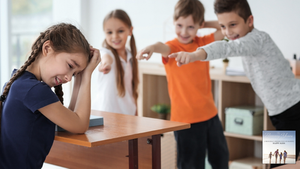
"I Just Don’t Know How to Help!" – A Parent’s Guide to Coping When School Gets Tough
Let’s take a closer look at how to gently support your child when school becomes a challenge. With slow, steady support, regular check-ins, and working through the ups and downs together, you’ll be showing them the kind of care that builds trust and resilience. Let’s break it down and explore how you can navigate this journey together.

Simple ways to help your child with their anxiety issues
Today’s children are growing up in a world filled with pressure from school demands to social media and even the stress they sense from adults. It’s no surprise that anxiety is becoming more common in younger children. The good news? We can teach them how to cope and thrive. Building resilience doesn't mean they'll never face challenges. It means they'll have the tools to bounce back, try again, and keep moving forward. And that’s one of the greatest gifts we can give them.

How to Help Your Child Thrive at School Without the Stress!
School life is full of twists, turns, and loop-the-loops. As a parent, you’re the safety harness, keeping your child steady through the ups and downs. But how can you support them without adding to the pressure? Here’s the quick-start guide to helping your child navigate school life with confidence and ease.

Encourage your child to be different
Encouraging your child to be different not only nurtures their individuality but also fosters critical thinking. Gail Smith shares insightful reasons why empowering children to question the status quo leads to personal growth. By teaching them not to always accept things as they are, we invite healthy curiosity and a deeper understanding of the world around them.

Persevering as a parent makes such a difference to your child
Parenting can be incredibly challenging, especially on days when you’re exhausted and overwhelmed. While scaling back on some parenting responsibilities might ease your burden, remember that perseverance will ultimately pay off. Gail Smith highlights the benefits of maintaining perseverance in parenting.

Keep An Eye On Your Child's Mental Health
Early detection of your child’s mental health can lead to more effective treatment options. If a parent notices their child is unusually withdrawn or anxious, addressing it early can prevent more serious issues like depression or anxiety disorders. Be alert to changed moods.

Managing anger around children.
It’s a natural part of life to feel anger. We need to understand that a child can often misinterpret our anger and will often take on much of the blame when we have a meltdown. Managing our anger around children is the best way to ensure your feelings do not overpower your child. Our angry outbursts can sometimes lead them to shut down and to avoid being in our presence.
Read on for some thoughts on how your anger can influence your child.

Teach your child to have a go and to be a risk taker
I know it’s hard if there are risks, but, teach your child to have a go and to be a risk-taker. Read on for some advantages of this.

Helping your child with bullying matters
Is your child facing a bully at school or in other social settings? Read on for some sound strategies.

Do you ever feel like you have hit rock bottom as a parent?
Everyone experiences moments like these as a parent. Here are a few tips to keep positive and that making mistakes is all part of parenting.

Is bullying an issue for your child?
Bullying is a serious issue. Here's a few parenting tips on how to keep focused of the issue of bullying.

Keeping the stress level down is a great asset as a parent
Stress is a natural part of life, especially when you're a parent. Here are a few ways to reduce your stress level for yourself and your child.

Children who find school a struggle
Many children have times when they feel they are struggling not just with school but also with friends, home issues, siblings, etc. Children can and do have down times. If your child is struggling, read here for some tips.

Feeling overwhelmed? It can happen to our children.
When a child feels overwhelmed by too much information, they simply shut down as a defence. Children can become just as overwhelmed as adults. Read here on some strategies to help avoid anxiety in your children.

Always keep the bright side of situations as your focus
Parenting come with a sense of being cautious and protecting your child. Be less afraid of taking a risk and letting in some positive thoughts.

Keep the conversations alive and frequent with your child
Read here for pointers to consider wayst to help your child process through the days, weeks, months and terms ahead at school. Children will always want to do the right thing and will be anxious if rules are broken or the messages unclear. They will then begin to feel vulnerable and anxious about what to believe. Gail Smith, The Primary Years.